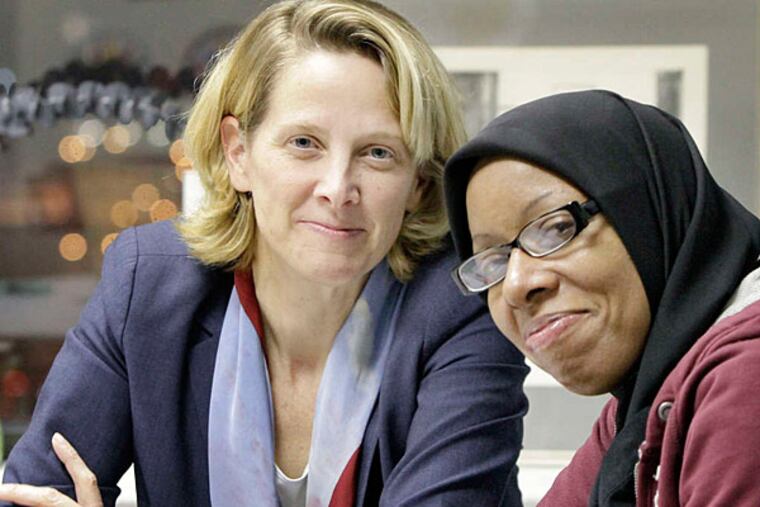Witnesses now warriors against hunger
They were women marooned in Philadelphia's poorest precincts, living isolated in chaos and privation. Then, five years ago, Drexel University School of Public Health Professor Mariana Chilton, who runs the Center for Hunger-Free Communities, proposed a compelling idea: Give the women cameras to document their lives, then bring them together to talk about the precious children, decrepit apartments, and empty refrigerators depicted in their photographs.

They were women marooned in Philadelphia's poorest precincts, living isolated in chaos and privation.
Then, five years ago, Drexel University School of Public Health Professor Mariana Chilton, who runs the Center for Hunger-Free Communities, proposed a compelling idea: Give the women cameras to document their lives, then bring them together to talk about the precious children, decrepit apartments, and empty refrigerators depicted in their photographs.
The women met, recognized pieces of themselves in one another, and never felt alone again. They formed an unlikely sisterhood called Witnesses to Hunger, an advocacy group that became internationally known after a story about them appeared in The Inquirer in 2008.
Since then, the Witnesses have spoken multiple times at the White House, have presented testimony to Congress about being down and hurting in America, and have been featured in the well-reviewed documentary about hunger, A Place at the Table, whose executive producers include Eagles owner Jeffrey Lurie and his former wife, Christina Weiss Lurie.
At 6 p.m. Wednesday at Drexel's Bossone Research Center, the still-growing Witnesses group - now numbering 84, augmented by newer members from five states and several cities, including Camden - will meet to reflect on their advocacy work. Their photos, at turns hopeful and desolate, will be on display through Thursday to mark the Witnesses' fifth anniversary.
"The other women and me - we built a whole family," said Imani Sullivan, 34, who lives on disability in Upper Darby.
"One person alone doesn't have a voice," said Shearine McGhee, 34, of North Philadelphia, also a Witness, and a nutrition assistant with a federal food program. "But together, we can sing a song."
During a time of austerity, however, the music isn't always being heard.
The U.S. House of Representatives is considering cutting $40 billion from the food-stamp program over 10 years. The Senate, which initially proposed holding the cuts to $4 billion, is contemplating nearly $9 billion in reductions to a program that the Witnesses say should be expanded, not slashed.
Resistance to helping the poor shouldn't diminish how people view the Witnesses, said Sen. Bob Casey (D., Pa.), an early supporter of the group who, through the years, helped them display their photos in the rotunda of the Russell Senate Office Building and in locations throughout the state.
"The Witnesses have placed pressure on the federal government, speaking on hunger," Casey said. "Believe me, I have felt their pressure personally. They're pushing us. These women are heroic."
It's a new kind of advocacy that seems to work, said Julie Zaebst, policy manager at the Greater Philadelphia Coalition Against Hunger. "The Witnesses bring personal experiences to public policy."
While it seems logical to include impoverished people in discussions on poverty, that's rarely the case, said Joel Berg, executive director of the New York City Coalition Against Hunger, and a national expert on hunger.
"There are few groups working on hunger in America that give low-income people leadership roles like Witnesses," Berg said. "But no social movement ever succeeded without the people involved being part of it. Women wouldn't be voting if we were all just waiting for men to help them."
When the Witnesses show up in a congressional office, Berg added, it's hard to ignore them.
Joining Witnesses has helped many of the women individually. It hasn't been a ticket out of poverty, necessarily, but several, such as Barbie Izquierdo, 26, prominently featured in the documentary, have experienced a sense of empowerment that nothing in life had provided before.
"Being in Witnesses gave me self-esteem," said Izquierdo, now a sought-after public speaker living in Northeast Philadelphia. She endured a childhood of sexual abuse and deprivation. Her Witnesses involvement inspired her to attend Eastern University's Esperanza College in North Philadelphia.
Chilton, who's expanding Witnesses to California, remains moved by the women and their endless struggles.
"I launched Witnesses because I want Congress to feel what it's like to sit in the kitchens of [the Witnesses] and listen," she said. "They are experts, and have experience and brilliance."